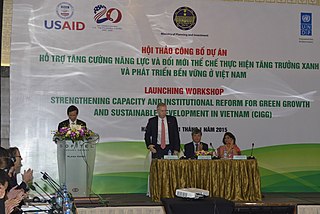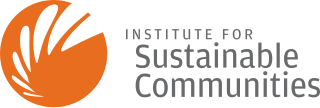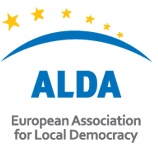
Social entrepreneurship is an approach by individuals, groups, start-up companies or entrepreneurs, in which they develop, fund and implement solutions to social, cultural, or environmental issues. This concept may be applied to a wide range of organizations, which vary in size, aims, and beliefs. For-profit entrepreneurs typically measure performance using business metrics like profit, revenues and increases in stock prices. Social entrepreneurs, however, are either non-profits, or they blend for-profit goals with generating a positive "return to society". Therefore, they use different metrics. Social entrepreneurship typically attempts to further broad social, cultural and environmental goals often associated with the voluntary sector in areas such as poverty alleviation, health care and community development.
Japan has been establishing its foreign aid contributors since the 1990s. The three government institutions involved in disbursing this are: the Japan International Cooperation Agency (JICA), and the Japanese Bank of International Cooperation (JBIC). This is now the nodal agency for all Japanese concessional loans, and replaced Japan Export-Import Bank (JEXIM) and the Overseas Economic Cooperation Fund (OECF) in 1999.

Capacity building is the improvement in an individual's or organization's facility "to produce, perform or deploy". The terms capacity building and capacity development have often been used interchangeably, although a publication by OECD-DAC stated in 2006 that capacity development was the preferable term. Since the 1950s, international organizations, governments, non-governmental organizations (NGOs) and communities use the concept of capacity building as part of "social and economic development" in national and subnational plans. The United Nations Development Programme defines itself by "capacity development" in the sense of "'how UNDP works" to fulfill its mission. The UN system applies it in almost every sector, including several of the Sustainable Development Goals to be achieved by 2030. For example, the Sustainable Development Goal 17 advocates for enhanced international support for capacity building in developing countries to support national plans to implement the 2030 Agenda.
The Commonwealth Foundation (CF) is an intergovernmental organisation that was established by the Commonwealth Heads of Government in 1966, a year after its sister organisation, the Commonwealth Secretariat. The Foundation is located at Marlborough House in London, a former royal palace which was assigned for the use of these Commonwealth institutions by Her Majesty Queen Elizabeth II, the former Head of the Commonwealth. As the Commonwealth agency for civil society, the Foundation is funded by 49 member states to support participatory governance through its programmes. The Foundation provides resources, grants and access to platforms to encourage better engagement between civil society and institutions of governance. Membership of the Commonwealth Foundation is voluntary and is separate from membership of the Commonwealth of Nations.

The Centre for Policy Dialogue (CPD), established in 1993 by Rehman Sobhan, its Founder chairman, with support from leading civil society institutions in Bangladesh, is mandated by its Deed of Trust to service the growing demand originating from the emerging civil society of Bangladesh for a more participatory and accountable development process. CPD seeks to address this felt-need from the perspectives of marginalised stakeholders, by way of organising multistakeholder consultations, by conducting research on issues of critical national, regional and global interests, through dissemination of knowledge and information on key developmental issues, and by influencing the concerned policy making processes.
Counterpart International is a non-profit organization based in Washington, D.C. Counterpart partners with local organizations to build inclusive, sustainable communities in which people thrive. Since its founding in 1965, Counterpart has established programs and activities in more than 65 countries on six continents.

The United States and North Macedonia enjoy excellent bilateral relations.

The North–South Centre, officially the European Centre for Global Interdependence and Solidarity, is a Partial Agreement of the Council of Europe, the oldest political organisation of European states.

The Institute for Sustainable Communities (ISC) is an independent, tax-exempt, nonprofit organization whose primary work includes finding community-based solutions to reducing climate pollution in the U.S. and China, building the capacity of civil society in the Balkans, and helping communities along the U.S. Gulf Coast and China recover from disasters. ISC provides training, technical assistance and financial support to communities, nonprofits/nongovernmental organizations, businesses and local governments.
The International Visegrad Fund is an international donor organization promoting development and closer cooperation among the Visegrad Group (V4) countries—the Czech Republic, Hungary, Poland and Slovakia. The main aim of the fund is to strengthen the ties among peoples and institutions in Central and Eastern Europe through giving support to regional non-governmental initiatives. The fund is the only institutionalized form of regional cooperation among the Visegrad Group countries.

UN-SPIDER is a platform which facilitates the use of space-based technologies for disaster management and emergency response. It is a programme under the auspices of the United Nations Office for Outer Space Affairs (UNOOSA).
Swisscontact – Swiss Foundation for Technical Cooperation is a Swiss non-profit-organisation, which carries out projects aiming at reducing poverty in developing and transition countries by private sector development. It has been founded in 1959 as a politically and denominationally neutral organisation and has 60 employees in Switzerland and approximately 1,400 staff abroad. The main fields of activity are fostering skills development, small and medium enterprises, financial services and resource efficiency.
The Center for Policy Studies in Ukraine is a non-governmental think tank in Ukraine, headquartered in Lviv. The Center deals with international politics, civil society, NGOs, education, politics, regional policy and legislature; it also conducts conferences and seminars. The Center for Policy Studies was established in 1994 and officially registered in 1997. One of its key objectives is to utilize the creative potential of the graduates and students of social sciences and humanities at Lviv University and other universities in Lviv and the region to promote democratic principles and civil society in Ukraine. The center works to assist the development of a network of teaching staff and innovative educational areas, and to implement activities aimed at developing professional, independent media to document the changing political environment of Ukraine.
The Foundation for Socio-Economic Justice (FSEJ) was founded in 2003 as an umbrella organization with a primary vision of initiating broad civic education programs to encourage democratic participation and raise awareness on human and constitutional rights amongst the rural populations of Eswatini. The primary goal of FSEJ is to help build a solid and unified mass based democratic force.
Created in 2007, the Universal Civil Identity Program in the Americas (PUICA) is the area of the Organization of American States (OAS) that is devoted to civil identity. It belongs to the Department for Effective Public Management within the Secretariat for Political Affairs.
The International Renaissance Foundation (IRF) is a Ukrainian NGO founded by George Soros. It was founded in April 1990. IRF is an integral part of the Open Society Foundations which incorporates national and regional foundations in more than thirty countries around the world, primarily in Central and Eastern Europe, as well as the former Soviet Union. These foundations share a common goal of supporting educational, social and legal initiatives that promote the development and establishment of an open society.

Western Indian Ocean Marine Science Association (WIOMSA) is a regional professional, non-governmental, non-profit, membership organization, registered in Zanzibar, Tanzania. The organization is dedicated to promoting the educational, scientific and technological development of all aspects of marine sciences throughout the region of Western Indian Ocean (Somalia, Kenya, Tanzania, Mozambique, South Africa, Comoros, Madagascar, Seychelles, Mauritius, Réunion (France)), with a view toward sustaining the use and conservation of its marine resources. The association has about 1000 individual members as well as about 50 institutional members from within and outside the region.

ALDA, the European Association for Local Democracy, is a membership based organisation established in 1999 at the initiative of the Council of Europe's Congress of Local and Regional Authorities. ALDA works on the promotion of good governance and citizen participation at the local level, focusing on activities that facilitate cooperation between local authorities and civil society in the European Union and its Neighbourhood.
The Hispanic Federation (HF) is a U.S based non-governmental organization focused on supporting Hispanic communities through local, state, and national advocacy. The Federation was founded in New York City in 1990 by a small group of Latino leaders, establishing initiatives to advocate for the interests of the Hispanic community and has expanded to establish programs, and policies in 16 states. The organization's objective is to empower and advance the Hispanic community primarily through service pillars, membership services, advocacy, and community programs. The Federation has formed relationships with a network of 100 Latino grassroots nonprofits, as well as collaborating with organizations, government officials, and private sector partners to enact systemic change related to a variety of socioeconomic issues for Hispanic communities. The Federation has gained national recognition for its work in areas of education, health, immigration, economic empowerment, civic engagement, environment, and organizational development to strengthening Latino institutions to ultimately increase the quality of life within Hispanic communities.

The Institute of International Politics and Economics is a scientific institute - an organization in the field of social sciences performing scientific and research activities of general interest to the Republic of Serbia.









